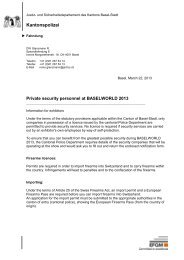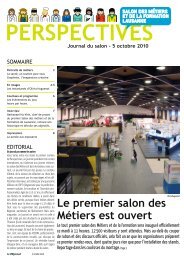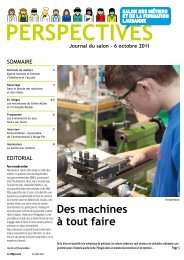MASTER MECHANICS
MASTER MECHANICS
MASTER MECHANICS
You also want an ePaper? Increase the reach of your titles
YUMPU automatically turns print PDFs into web optimized ePapers that Google loves.
74 BEHIND THE SCENES europa star<br />
previously in real trouble, however the ranching<br />
of the Nile crocodile is of great importance,<br />
especially in places like Zimbabwe and<br />
is the origin of many skins or products coming<br />
into Switzerland. The skin is also considered<br />
extremely valuable.<br />
The GTE and the FH take a stand<br />
Following the broadcast of the Rundschau film,<br />
the Geneva Time Exhibition (GTE - show of 60<br />
watch brands held from January 16th to 21st in<br />
Geneva) and the Federation of the Swiss Watch<br />
Industry (FH) have been encouraging their<br />
respective members to acknowledge the situation<br />
and check the sources of their straps.“We<br />
sent a press release to all our partners and<br />
received positive echoes from the brands in<br />
return,” shares Florence Noël, Director of the<br />
GTE show. “Brands such as Pierre DeRoche<br />
only use Mississippi alligator, but shared with<br />
me that they would consider not using exotic<br />
animal skins if they couldn’t verify their source,”<br />
she continues. Some brands, such as Tempvs<br />
Compvtare, also exhibiting at the GTE show,<br />
have made a point from their inception never to<br />
use any animal products in their collections.<br />
Food for thought<br />
For those who saw the Swiss German television<br />
report (available on the Europa Star<br />
website), it is difficult not to be shocked by<br />
the sensational images that were broadcast.<br />
However, we must remain attentive to certain<br />
elements of the report.<br />
Firstly, the film switched back and forth from<br />
the Indonesian rural outlet to the shop windows<br />
of luxury watch brands without any<br />
proof that they were linked in any way.<br />
Secondly, the film shows the CITES permits for<br />
the skins as if to accuse the treaty of not controlling<br />
the animals’ wellbeing, without any apparent<br />
understanding that the CITES treaty is<br />
designed to ensure the sustainability of the<br />
species, being exported, and has no control over<br />
what happens within the borders of any country.<br />
Thirdly, each country, each nation, each culture,<br />
has a different relationship to animals.<br />
The rural relationship to animals is very different<br />
from that of many urban people – why<br />
else would Indonesians have been happy to<br />
let a film crew in if they were ashamed of<br />
what they were doing? Certain images showed<br />
animals moving after they had supposedly<br />
been killed. Many animals continue to move<br />
minutes after they are clinically dead (think of<br />
the chicken that continues running after it has<br />
had its head chopped off).<br />
And lastly, images showed snakes being hit<br />
over the head, which obviously appears barbaric<br />
on screen, but is actually one of the<br />
most humane ways to kill a snake rapidly.<br />
These are all facts that watch brands and their<br />
retailers should know, facts that they need to<br />
communicate to their customers correctly, facts<br />
that should make them proud of contributing<br />
to biodiversity conservation, but encourage<br />
them to be more attentive to a part of their<br />
business that could change the way we protect<br />
nature. “‘Business as usual’ won’t work<br />
anymore; the planet cannot support it and the<br />
people won’t allow it. I hope that good things<br />
will come out of this report and businesses will<br />
stand up and take action,” concludes Vasquez.<br />
What the watch industry<br />
can do to help<br />
The watch industry needs to inform itself<br />
about the provenance of its straps and the<br />
ways in which the animals were killed. If the<br />
watch brands take action and become more<br />
demanding, this will put pressure on those<br />
working in the skin trade, farms, ranches and<br />
governments to take initiatives to better protect<br />
animal wellbeing and the environment,<br />
like the great programmes that have been set<br />
up in Louisiana and Zimbabwe. There is no<br />
need for watch brands to stop using exotic<br />
animal skins, on the contrary, but if they do<br />
not start to pay attention to this important<br />
part of their business, there is a risk that it<br />
could turn around and bite them.<br />
For more information including the Swiss television<br />
report (in German and French) press<br />
releases from The Swatch Group, The FH, The<br />
GTE and The State of Louisiana (the world’s<br />
largest alligator farming/ranching industry)<br />
click on www.europastar.com. O
















